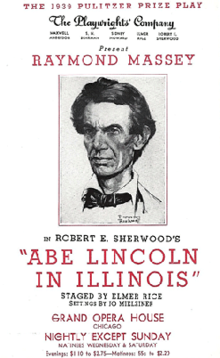Abe Lincoln in Illinois (play)
The play, in three acts, covers the life of President Abraham Lincoln from his childhood through his final speech in Illinois before he left for Washington.
Directed by Elmer Rice, it starred Raymond Massey as Lincoln, Muriel Kirkland (Mary Todd), Adele Longmire (Ann Rutledge), and Albert Phillips (Stephen A.
[8] The play emphasizes the need to overcome laissez-faire sentiment and to stand up and take firm political action for the public good.
Lincoln is portrayed not as a saint or a fount of wisdom, but as a humble man of ideas who constantly questions himself and his ability to make a difference.
Ann Rutledge, the first great love of his life, is portrayed as Lincoln sees her, as a selfless but ultimately unattainable embodiment of female perfection.
[10] The opening scene of the play depicts New Salem's schoolmaster teaching grammar to Lincoln and encouraging him to appreciate poetry and oratory.
[7] In Scene 2, Lincoln meets a number of young politicians at the Rutledge Tavern in New Salem to explore the possibility of him running for the Illinois General Assembly.
[7] A year later, Scene 3 sees his friends discussing Lincoln's relative lack of success in his career as an assemblyman and his unrequited romance with Ann, which they feel is a hindrance.
Lincoln's friends urge him to re-enter politics but he disclaims any desire to "get down into the blood-soaked arena and grapple with all the lions of injustice and oppression".
[11] In Scene 7, Lincoln meets a friend who is heading west and is confronted by the fact that the infamous decision in Dred Scott v. Sandford has effectively extended slavery there as well.
[11] Scene 9 opens with Lincoln and his rival senatorial candidate Stephen A. Douglas making opposing speeches on slavery in an Illinois town during the 1858 campaign for the U.S.
[11] Jumping to 1860 in Scene 10, Lincoln and Mary sit in the parlor of their house with their boys, awaiting the arrival of senior politicians intent on sounding him out for the Republican Party's presidential nomination.
Mary is angered by her eldest son's habit of smoking in the house and Lincoln's failure to tell her about the politicians' visit, though she recognizes the burden of her growing irritability, which prefigures her eventual insanity.
The 1964 production in the Hallmark Hall of Fame series featured Jason Robards in the title role, and Kate Reid as Mary Todd.
The Herald Tribune's reviewer, Richard Watts Jr., called it "Not only the finest of modern stage biographies, but a lovely, eloquent, endearing tribute to all that is best in the spirit of democracy.
"[15] The critic Brooks Atkinson called it Sherwood's "finest play" and commended it for furthering "the principles of American liberty" while still providing an honest presentation of Lincoln's formative years.
Some critics praised its sweep and Sam Waterston's performance, but others, like David Richards of The New York Times, felt it was too "didactic or melodramatic".
When Lincoln finds his life's purpose and steels himself for the ordeals to come, Mr. Waterston is able to suggest great stature simply by standing tall and motionless.
